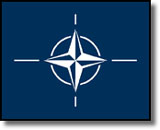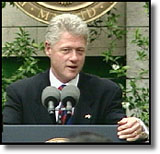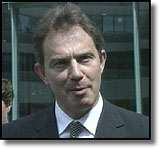
|
Agreement Over NATO ExpansionThe NATO heads of government, meeting in Madrid, have reached agreement on enlarging the military alliance. Poland, Hungary and the Czech Republic are being invited to join.The expansion, was announced by NATO's Secretary General, Javier Solana. He said the three new members would be ratified on the 50th anniversary of the Washington Treaty in April 1999. He added that the Alliance would continue to welcome new members, and that NATO would expect to invite other countries to join in coming years.
It is expected that Romania and Slovenia will be strong candidates for the next wave of expansion - France and Italy had led a group of nations arguing for the two countries to be included in the current enlargement. The French President, Jacques Chirac, warned that NATO could damage its cohesion by excluding them. The Prime Minister, Tony Blair, and the US President, Bill Clinton, had presented a common front to slow down enlargement.
Clinton Hails a Great Day for the Cause of Freedom"The statement we released today and the decision we made was a genuine consensus effort and I am profoundly grateful to all of my fellow world leaders who are part of NATO," Clinton said after the Western alliance had agreed to the largest expansion in its 48-year history.
Collective Security"I think yes, of course some countries would like to have gone further but I think we got a realistic, sensible agreement," he said. "People understand that the whole purpose of Nato is collective defence, that an attack upon one is an attack upon all. Now it's for that very reason that we have got to be so careful of expanding this military guarantee." Rejecting talk of rifts within Nato and particularly between the US and the French, he said: "What is important is to understand this is not a political club that people are joining; it is a military alliance and, if we are to put our fighting forces into the front line, we have to very sure that it's the right thing to do." That meant moving "carefully, step by step" to ensure Nato remained strong as a defensive force, he said.
The Foreign Secretary Robin Cook used the summit to issue a warning that Britain will block Spain from being integrated into NATO's military structure if it fails to compromise over the use of Gibraltar as a military base.
|
Diana, Princess of Wales, 1961-1997
Conference 97
Devolution
The Archive
News |
Issues |
Background |
Parties |
Analysis |
TV/Radio/Web
Interactive |
Forum |
Live |
About This Site
News |
Issues |
Background |
Parties |
Analysis |
TV/Radio/Web
Interactive |
Forum |
Live |
About This Site
© BBC 1997 |
politics97@bbc.co.uk |


